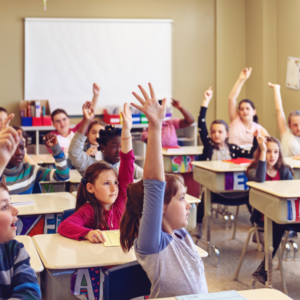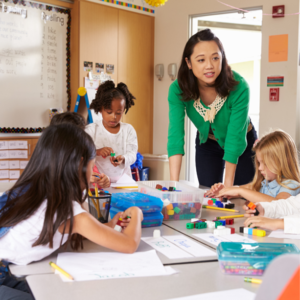Back to School: Key Strategies to Encourage Student Engagement and Belonging
By, Jessie Tobin and Maria Khan
Another summer has flown by, and students and educators around the world are returning to school in September. After months of summer break, getting back into the school schedule and engaging in school activities can be challenging for many students and teachers. In this blog, we discuss strategies based on NYKids’ research that may help create smoother transitions back to school.

While we hope educators had the chance to spend the summer break enjoying well-deserved rest and relaxation, we also know that the work does not often end when the school doors close for summer. For instance, this summer the NYKids team connected with many educators through our COMPASS continuous improvement workshops. During these sessions, we witnessed the hard work and dedication educators put in towards creating positive learning experiences for students when they return to school. Building belongingness, increasing engagement and establishing strong relationships among educators and students is a top priority for the 2023-24 academic year for many of the educators and school leaders with whom we worked.
These efforts coincide with research that suggests building positive relationships among school staff and students in the first few weeks of school especially can lead to stronger engagement, long-term student trust and attachment to school, and positive learning experiences for students through the year.
Setting the Tone and Establishing Positive Teacher-Student Relationships from the Start
Beginning the school year with intention by focusing on educator-student relationships is key to active and engaged learning. There are several promising strategies that educators can incorporate to ensure students are comfortable in their new classrooms. These include:
- Create a welcoming environment by getting to know each other through meaningful class activities
- Being responsive and inclusive
- Managing two-way communication effectively and efficiently
- Being active listeners
- Holding meet-and-greet and back-to-school sessions
- Seeking input from previous teachers about your new students
- Building relationships with families and fostering home-school partnerships
- Making personal connections in addition to academics
Fostering Positive Peer-Peer Relationships: Examples from NYKids Research
 NYKids’ 2018-2019 study exploring College and Career Readiness of secondary students discovered promising strategies for how school staff can encourage healthy relationships among youth. In particular, we found that the ecologies and climates surrounding youth within these schools were especially impactful for high school students in their preparation for life beyond school. Promising practices to build peer relationships used in positive outlier schools we studied included:
NYKids’ 2018-2019 study exploring College and Career Readiness of secondary students discovered promising strategies for how school staff can encourage healthy relationships among youth. In particular, we found that the ecologies and climates surrounding youth within these schools were especially impactful for high school students in their preparation for life beyond school. Promising practices to build peer relationships used in positive outlier schools we studied included:
Modeling Positive Relationships
- Promoting a shared culture of collaboration among staff encourages collaboration among students
- Modeling collegiality and supportive relationships for students to follow among their peers
- Establishing an “open door policy” by school leaders for both staff and students
Promoting Diverse Groupings of Students
- Creating formal and informal mentoring programs to allow youth to assist one another during and outside of class
- Encouraging students who may not typically interact to work in groups during class time
- Developing school-wide activities to promote engagement among students from varying grades, backgrounds, and social groups
Creating a Range of Extracurricular and School-Wide Activities
- Connecting youth with peers outside of their own school community to develop stronger empathy and understanding
- Supporting student-led initiatives and leadership opportunities such as restorative justice practices and student-run civic engagement activities
- Designing extra-curriculars around student interests to promote peer-peer relationships throughout the entire school
A strong start to the school year can lead to a strong finish. Positive relationships can help foster the strong classroom community which is foundational for the academic success and rigor that goes into attaining learning outputs. The time and effort invested in relationship building can create opportunities for greater student success outcomes.
Our team at NYKids would love to hear how you have managed the first week at your school. Share your experiences with us on our social media accounts (Facebook, Twitter/X, Instagram, LinkedIn) or send us an email at nykids@albany.edu.
